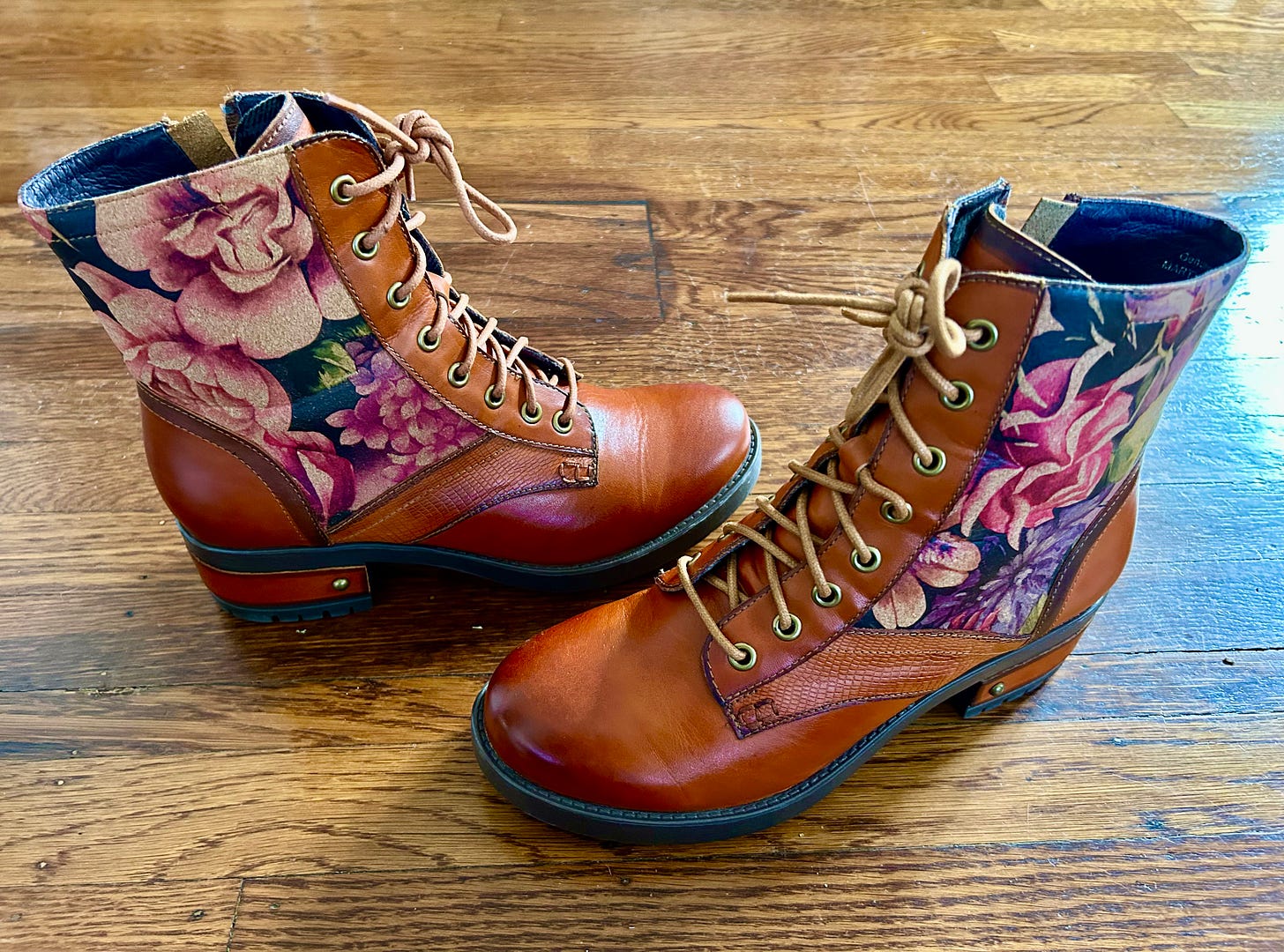
I went shopping on Black Friday — by mistake. That is, I didn’t set out to shop on Black Friday, the last thing on Earth I would normally do. It just kind of happened.
Friends were visiting from out of town, and we found ourselves walking down Solano Avenue in Berkeley. I rarely go there, because it’s a 15-minute drive from our house, I’m lazy, and I don’t have many reasons to head that way. I’m not into shopping, the main Solano Avenue activity other than dining out; it’s not something I think of doing when I have free time. But it was great to be out on a sunny stroll with dear old friends on a warm November day (sorry, East Coast and Midwest peeps!).
What was I supposed to do when we came upon a cool-looking, uncrowded shoe store having a Black Friday sale? I ended up buying these boots; I think you’ll agree that they would have been hard to pass up.
I mean, they’re beautiful, unique, and have good walking soles! Be still, my beating heart!
At least it was a local store. So I can say I was a day early for Small Business Saturday.
All about buying
But why does this day, and this time of year, have to be about buying anything?
No matter where you turn, that’s the theme. I’ve been getting emails from sustainability-focused organizations about what to buy this season. Rewiring America, a nonprofit devoted to promoting electrification, let me know about their “Bye, gas. Buy electric!” gift guide. OhmConnect, a company that pays people to reduce their energy use at times when the power grid is strained, directed me to a list of what to buy on Black Friday for my “smart and energy-efficient home.” Green America, a nonprofit working to “create a socially just and environmentally sustainable society,” provided a list of green gifts.
All of these great organizations are doing commendable work. I’m glad they exist. Certainly, if you’re going to buy appliances and electronics, they should be efficient and powered by electricity instead of gas. If you must shop on Black Friday, why not make your purchases energy-efficient? If you have to buy holiday gifts, “green” is better than not green.
But it’s still buying.
For much of my life, I’ve been hearing how we’re helping the economy by consuming — a message that rings loudest at this time of year. We’re made to feel guilty if we don’t do our part by buying. Many businesses rely on holiday shopping to stay afloat; to help them, we’re supposed to up our spending during the season. And we do. Apparently, the average American spends nearly $1,500 on the holidays, with $923 of that expected to go toward holiday gifts this year — and that’s considered moderate spending, down slightly from last year.
Solving our problems another way
But buying, even if it’s “green,” isn’t going to solve the problems of climate change, biodiversity loss, and mass extinctions.
Don’t get me wrong. We’ve bought an electric car. We’ve also purchased solar panels and an induction stove, and we hope to follow that with heat pumps to heat our house and our water. In other words, we’re buying stuff to do our small part to fight climate change.
What could we do differently?
Take electric cars. Even if all our cars became electric tomorrow, we’d still have too many cars. Manufacturing any cars, including electric cars, uses up precious natural resources. Walking and biking, on the other hand, improve our physical and emotional health. But we don’t build the infrastructure to support these activities and make our cities more livable — and we encourage larger and larger cars. We make it hard to get around our cities without cars, especially compared to many other countries. Building up our public transit and biking infrastructure, while making walking safer and more pleasant, could help us reduce the need for cars — and save us all money.
Cars are just one example. Rampant consumerism extends to every aspect of our lives. In that context, it’s not surprising that the message has been that we need to change what we consume, not how we live. No one — other than Marie Kondo — wants to say we should instead do with less, an unpopular idea politically. No one wants to say we should live more simply and get pleasure and contentment from things like community, nature, and activities like walking or dancing, rather than seeking it in endless shopping.
Instead of simply buying more cars, appliances, and electronics, we need to change our current consumption-centric system. We need a major shift in our relationship to stuff.
Do I think that will happen? Not anytime soon.
What will it take?
Radical change like that takes a seriously strong impetus. You’d think we already had one — well, way more than one. We recently passed the dreaded 2 degrees Celsius climate milestone; we’re in the midst of a mass extinction; extreme heat, wildfires, and superstorms are becoming common events. If all of this isn’t enough, I don’t know what it will take.
But we could at least try to slow down our excessive consumption, knowing that even that would require a major shift in thinking.
We can start with Christmas. What value is there in the tons of Christmas presents we buy every year — many of which are unnecessary and possibly even unwelcome? I’m sure I’ve posted this video before, but Tom Lehrer has an always-entertaining take on it:
I feel fortunate in this regard.
Years ago, I had a group of friends who insisted that we all exchange Christmas presents. Not only that: we had to sit in a circle and watch while each of us took turns opening presents. Not only that: two of the friends, both guys, had birthdays near Christmas, and every year I’d agonize over what the heck to get them. Finally, I suggested that we stop the Christmas present tradition. One of my friends responded, “Some of us like giving people presents!” She might as well have prefaced that with “unlike you”; the implication was clear.
I didn’t bring it up again, but my friend group has shifted since then. Now, even Rafael and I don’t exchange Christmas presents. It would be different if we had kids, but as adults we really aren’t feeling the need for presents. The result? Christmas is way more stress-free. What’s even more valuable: we can spend our precious time hanging out with our friends rather than shopping for them.
Not everyone feels like they can stop buying Christmas presents, but it’s something to consider. While we’re at it, let’s take a closer look at our society’s focus on consumption, now and all year round. Our rampant consumerism, combined with unchecked greed, got us into the mess we’re in today. Surely, consuming different stuff isn’t the way to get us out of it.





Loved it, as always. I agree that shopping is still shopping. But I do think there are voices out there besides Marie Kondo :o) I see this in the form of individuals and small groups rather than strong political agendas, to be sure. Buy Nothing and FreeCycle groups, the efforts of people in our community towards a circular economy (for profit), certain Instagram hashtags, you, me! There are opportunities to influence one person at a time to turn down or turn off their own personal consumer spigot.
Another good one! My boss is great — she only wants consumable gifts, if she accepts a gift at all. In other words, food. I brought her sea salt from a shack we found selling it on the coast of Oregon! Sending people experiences is also nice — a gift card to a beloved restaurant is often a gift for my nephews.🤷🏻♀️